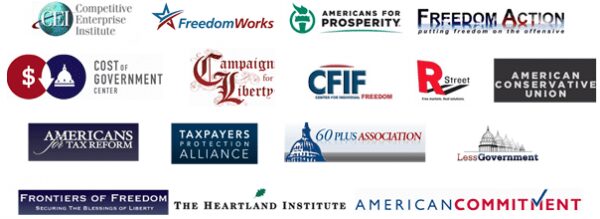
TPA Joins Coalition Supporting REINS Act of 2013 in the Senate
Taxpayers Protection Alliance
October 30, 2013

Federal regulatory policies and the agencies under their control have grown exponentially over the last several years. It is no secret that that increased regulations have made it more difficult for entrepreneurs to do business due to the many hurdles they are forced to jump, and most times these new regulations are unanticipated. There has been movement in Congress to get the ever-expanding regulatory machine under control. Last week, in an effort led by the Competitive Enterprise Institute, TPA signed a coalition letter, along with the 60 Plus Association, American Commitment, American Conservative Union, Americans for Prosperity, Americans for Tax Reform, Campaign for Liberty, Center for Individual Freedom, Cost of Government Center, Freedom Action, FreedomWorks, Frontiers of Freedom, The Heartland Institute, Less Government, and the R Street Institute supporting Senate legislation entitled the Regulations from the Executive In Need of Scrutiny Act of 2013 (aka the “REINS Act”). The REINS Act seeks to restore legislative control and accountability to the federal regulatory process by providing for meaningful congressional oversight over new regulations that agencies impose by requiring both houses of Congress to approve any proposed “major rule” (which is any rule likely to affect the economy by $100 million or more) before going into effect. The amount of new regulations is astonishing, and in some cases you can see how far agencies are going overboard just by looking at a single piece of legislation. TPA is dedicated to ‘reining in’ the regulatory machine and will continue to work towards that goal.
Read the full letter below:
October 28, 2013
Dear Member of the United States Senate:
We, the undersigned public interest organizations, write to urge you to support the Regulations from the Executive In Need of Scrutiny Act of 2013 (the “REINS Act”). This bill restores legislative control and accountability to the federal regulatory process by providing for meaningful congressional oversight over new regulations agencies impose on the American people. It requires both houses of Congress to approve any proposed “major rule”—that is, any rule likely to affect the economy by $100 million or more—before such a rule goes into effect. The REINS Act already passed the U.S. House of Representatives by a sizeable margin. H.R. 367, 113th Cong. (passed by House, Aug. 2, 2013). It is now time for the Senate to follow suit.
James Madison, the father of our Constitution, wrote in Federalist No. 47 that the “accumulation of all powers, legislative, executive, and judiciary, in the same hands … may justly be pronounced the very definition of tyranny.” Despite Madison’s warning, federal agencies increasingly make rules based loosely on federal laws, enforce these rules against private parties and adjudicate enforcement actions before administrative law judges who serve the executive branch.
“The accumulation of these powers in the same hands is not an occasional or isolated exception to the constitutional plan,” warns John Roberts, the Chief Justice of the United States; rather, “it is a central feature of modern American government.” City of Arlington v. FCC, 133 S. Ct. 1863, 1878 (2013) (Roberts, C.J., dissenting). Professor Jonathan Turley, writing in The Washington Post, argues “[o]ur carefully constructed system of checks and balances is being negated by the rise of a fourth branch, an administrative state of sprawling departments and agencies that govern with increasing autonomy and decreasing transparency.” The rise of the fourth branch of government, Wash. Post, May 25, 2013.
The REINS Act, therefore, aims to ensure Congress monitors the laws it writes and considers how they affect the American people. This is especially important given that, for the first time in history, annual regulatory compliance costs amounted to $1.8 trillion in 2012, which, for the first time, was more than half of all federal outlays ($3.4 trillion), according to the Competitive Enterprise Institute’s 2013 report, “Ten Thousand Commandments: An Annual Snapshot of the Federal Regulatory State.” The REINS Act curtails some of the executive branch’s authority, but it respects our Constitution’s structure.
As Professor Jonathan Adler writes, “[w]hile the REINS Act would reduce the discretion of executive and independent agencies to adopt far-reaching regulatory measures, it would neither interfere with core executive functions nor constrain the inherent discretionary authority of the executive branch.” Placing “Reins” On Regulations: Assessing the Proposed REINS Act, 16 N.Y.U. J. Legis. & Pub. Pol’y 1 (2013).
We recognize some federal regulations may deliver net benefits to the American people. Importantly, the REINS Act does not prevent agencies from promulgating such regulations, nor does it discourage Congress from approving them. Rather, the bill merely ensures major new rules—whether beneficial or otherwise—face the meaningful scrutiny of the peoples’ representatives in Congress. The REINS Act offers Congress an opportunity to re-affirm beneficial agency rules, yet still reject rules which do more harm than good. The bill thus rebalances the power dynamic in Washington, giving it back to those who are accountable to the American people—at the expense of unelected bureaucrats. Our Constitution demands nothing less.
Sincerely,
Lawson Bader, Competitive Enterprise Institute
Wayne Brough, FreedomWorks
Christine Hanson, Americans for Prosperity
David Williams, Taxpayer’s Protection Alliance
John Tate, Campaign for Liberty
Joseph Bast, The Heartland Institute
Coley Jackson, Freedom Action
Phil Kerpen, American Commitment
George Landrith, Frontiers of Freedom
Seton Motley, Less Government
Larry Hart, American Conservative Union
James Martin, 60 Plus Association
Tim Lee, Center for Individual Freedom
Grover Norquist, Americans for Tax Reform
Andrew Moylan, R Street
Mattie Duppler, Cost of Government Center
